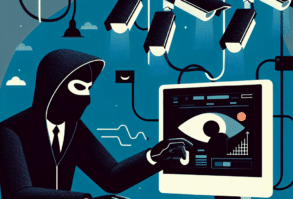In today’s digital age, cybersecurity has become a top priority for individuals and organizations alike. With cyber threats becoming more sophisticated and prevalent, it is crucial for everyday users to take proactive steps to safeguard their digital world. This article aims to provide essential cybersecurity tips for everyday users, empowering them to strengthen their online security. From practical advice on password management to understanding the importance of software updates, these tips will help individuals navigate the digital landscape with confidence. Additionally, we will explore the role of end users in strengthening cybersecurity and the importance of cybersecurity education in building a safer digital future. So whether you are a college student, a working professional, or simply someone who values their online privacy, this article will provide you with the knowledge and tools to protect yourself in the ever-evolving cybersecurity landscape.
- 1. "Essential Cybersecurity Tips for Everyday Users: Safeguarding Your Digital World"
- 2. "Empowering End Users: The Key to Strengthening Cybersecurity"
- 3. "The Importance of Cybersecurity Education: Building a Safer Digital Future"
1. "Essential Cybersecurity Tips for Everyday Users: Safeguarding Your Digital World"
In today’s digital age, cybersecurity has become a crucial aspect of our everyday lives. With the increasing threats of cyber attacks and online privacy breaches, it is important for every individual to take proactive measures to safeguard their digital world. Here are some essential cybersecurity tips for everyday users:
1. Keep your devices up to date: Regularly updating your operating system, antivirus software, and other applications is vital to ensure that you have the latest security patches. These updates often include fixes for known vulnerabilities that cybercriminals may exploit.
2. Use strong and unique passwords: Creating strong passwords is the first line of defense against unauthorized access. Make sure your passwords are at least 12 characters long and include a combination of uppercase and lowercase letters, numbers, and special characters. Avoid using easily guessable information such as your name, birthdate, or common words. Additionally, use a different password for each online account to prevent a single breach from compromising multiple accounts.
3. Enable two-factor authentication (2FA): Two-factor authentication adds an extra layer of security by requiring you to provide a second form of authentication, such as a code sent to your mobile device, in addition to your password. This makes it much harder for attackers to gain unauthorized access to your accounts, even if they manage to obtain your password.
4. Be cautious of phishing attempts: Phishing emails and websites are designed to trick you into revealing sensitive information or downloading malicious software. Be wary of suspicious emails, especially those requesting personal information or urging you to click on a link. Always verify the legitimacy of an email or website before providing any sensitive information.
5. Be mindful of your online presence: Be cautious about the information you share online. Avoid oversharing personal details on social media platforms, as this information can be used by cybercriminals to target you. Regularly review your privacy settings and limit the amount of personal information that is publicly accessible.
6. Regularly backup your data: Creating regular backups of your important files is essential in case of a data loss incident, such as a ransomware attack. Use an external hard drive, cloud storage, or both to ensure that your data is secure and easily recoverable.
7. Educate yourself and stay informed: Cybersecurity threats are constantly evolving, so it is important to stay updated on the latest trends and best practices. Take advantage of cybersecurity education resources available online, such as blogs, podcasts, and webinars. By staying informed, you can better protect yourself from potential threats.
By following these essential cybersecurity tips, you can significantly reduce the risk of falling victim to cyber attacks and protect your digital world. Remember, cybersecurity is a shared responsibility, and by taking proactive measures, you are contributing to a safer online environment for everyone.
2. "Empowering End Users: The Key to Strengthening Cybersecurity"
In today’s interconnected world, cybersecurity is a pressing concern for individuals and organizations alike. With the increasing frequency and sophistication of cyberattacks, it has become crucial to empower end users with the knowledge and tools they need to protect themselves and their data. Educating end users about cybersecurity best practices is the key to strengthening overall cybersecurity.
End users, which include employees, students, and individuals, are often the weakest link in the cybersecurity chain. They can unknowingly click on malicious links, fall for phishing scams, or use weak passwords, inadvertently exposing themselves and their organizations to cyber threats. By empowering end users with cybersecurity education, we can significantly reduce the risk of cyberattacks.
One of the most effective ways to empower end users is through comprehensive cybersecurity training programs. These programs should cover a range of topics, including password hygiene, safe browsing habits, email security, and social engineering awareness. By teaching end users how to identify and respond to potential threats, they can become the first line of defense against cyberattacks.
In addition to training programs, organizations should also implement user-friendly security measures. This includes providing secure browsing tools, email filters, and password managers to make it easier for end users to adopt good security practices. By simplifying the process of staying secure, organizations can encourage end users to actively participate in cybersecurity efforts.
Another important aspect of empowering end users is fostering a culture of cybersecurity awareness. Organizations should promote a proactive approach to cybersecurity, encouraging end users to report suspicious activities and potential vulnerabilities. By creating an environment where end users feel comfortable discussing cybersecurity concerns, organizations can prevent potential threats from going unnoticed.
It is important to recognize that cybersecurity is not solely the responsibility of IT professionals. Everyone, from the CEO to the intern, plays a role in maintaining a secure environment. By emphasizing the importance of cybersecurity education and empowering end users, organizations can create a collective defense against cyber threats.
In conclusion, empowering end users is the key to strengthening cybersecurity. By providing comprehensive cybersecurity education, implementing user-friendly security measures, and fostering a culture of cybersecurity awareness, organizations can significantly reduce the risk of cyberattacks. In a world where cyber threats are constantly evolving, it is essential to equip end users with the knowledge and tools they need to stay safe online. Together, we can create a more secure digital landscape.
3. "The Importance of Cybersecurity Education: Building a Safer Digital Future"
In today’s increasingly digital world, cybersecurity has become a crucial aspect of our daily lives. With cyber threats on the rise, it is more important than ever to prioritize the security of our digital assets and information. While businesses and organizations often invest in robust cybersecurity measures to protect their systems, the role of individual users cannot be emphasized enough.
End user security is vital in ensuring a safer digital future. Every individual who uses the internet, whether for personal or professional purposes, has a responsibility to educate themselves about cybersecurity best practices. This is where cybersecurity education plays a vital role.
Cybersecurity education equips individuals with the knowledge and skills necessary to navigate the digital landscape safely. It helps users understand the potential risks and threats they may encounter online, enabling them to take proactive measures to protect themselves and their information. By educating oneself about cybersecurity, individuals become more aware of the various ways cybercriminals can exploit vulnerabilities and infiltrate systems.
Moreover, cybersecurity education empowers individuals to make informed decisions when it comes to using technology. It enables them to identify phishing attempts, avoid suspicious websites, and recognize social engineering tactics used by cybercriminals. By understanding the importance of strong passwords, regular software updates, and data encryption, individuals can significantly reduce their risk of falling victim to cyber attacks.
Furthermore, cybersecurity education is not limited to just end users. It also encompasses professionals in the field who are responsible for designing, implementing, and managing secure systems. By staying updated with the latest trends, techniques, and tools in cybersecurity, these professionals can better protect the systems they manage and mitigate potential risks effectively.
In a world where technology is constantly evolving, cybersecurity education must be an ongoing process. As cyber threats continue to evolve and become more sophisticated, individuals must keep up with the latest trends and best practices in order to stay one step ahead of cybercriminals.
Ultimately, the importance of cybersecurity education cannot be overstated. By investing in our own knowledge and understanding of cybersecurity, we not only protect ourselves but also contribute to building a safer digital future. So, let’s prioritize cybersecurity education and work towards a more secure and resilient digital ecosystem.
In today’s rapidly evolving digital landscape, cybersecurity is more crucial than ever before. As we navigate through our daily lives, both personally and professionally, it is essential that we take proactive steps to safeguard our digital world. This article has explored three key aspects of cybersecurity: essential tips for everyday users, the importance of empowering end users, and the significance of cybersecurity education.
By implementing the cybersecurity tips outlined in this article, such as using strong and unique passwords, enabling two-factor authentication, and keeping software up to date, individuals can significantly enhance their online security. These simple yet effective measures can go a long way in protecting sensitive information and preventing cyberattacks.
Additionally, empowering end users is vital in strengthening cybersecurity. By providing individuals with the knowledge and tools they need to protect themselves, organizations can create a collective defense against cyber threats. Regular training sessions, awareness campaigns, and user-friendly security tools can empower end users to become the first line of defense against potential attacks.
Furthermore, cybersecurity education plays a crucial role in building a safer digital future. By educating individuals from an early age about the importance of online safety, we can foster a culture of cybersecurity awareness. This education should cover not only the basics of password hygiene and safe browsing habits but also more advanced topics such as social engineering and phishing. By equipping individuals with the knowledge to identify and respond to potential threats, we can create a more resilient digital society.
As technology continues to advance, so do the tactics employed by cybercriminals. It is therefore imperative that we stay vigilant and continuously adapt our cybersecurity practices. By following the daily tips outlined in this article, empowering end users, and investing in cybersecurity education, we can collectively work towards a safer online environment for all. Let us embrace the responsibility of protecting our digital world and build a future where cybersecurity is ingrained in our everyday lives.






